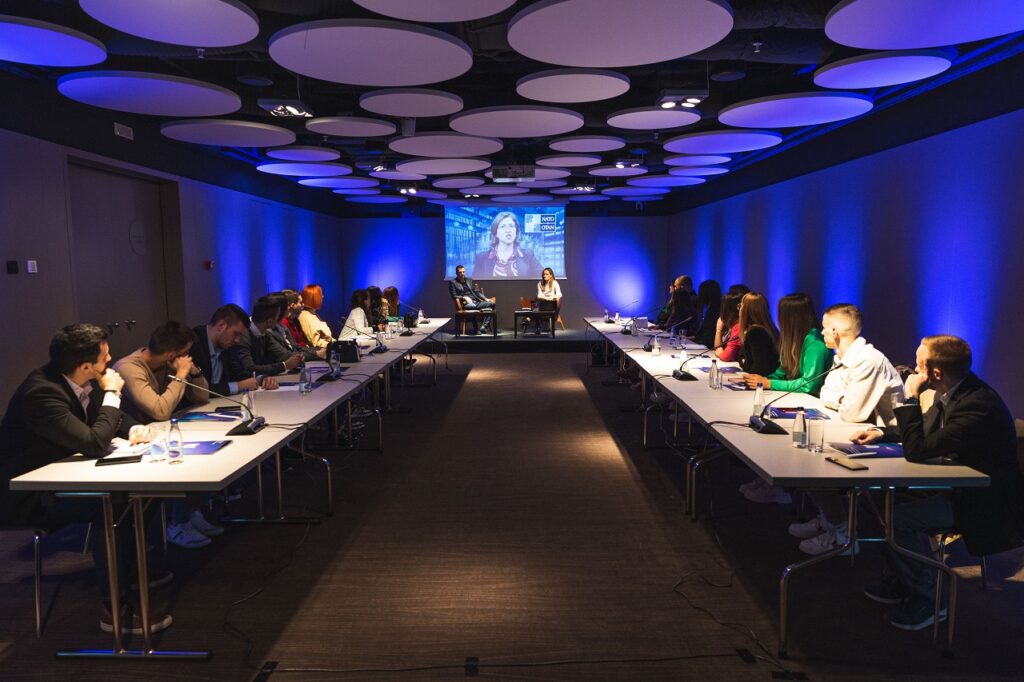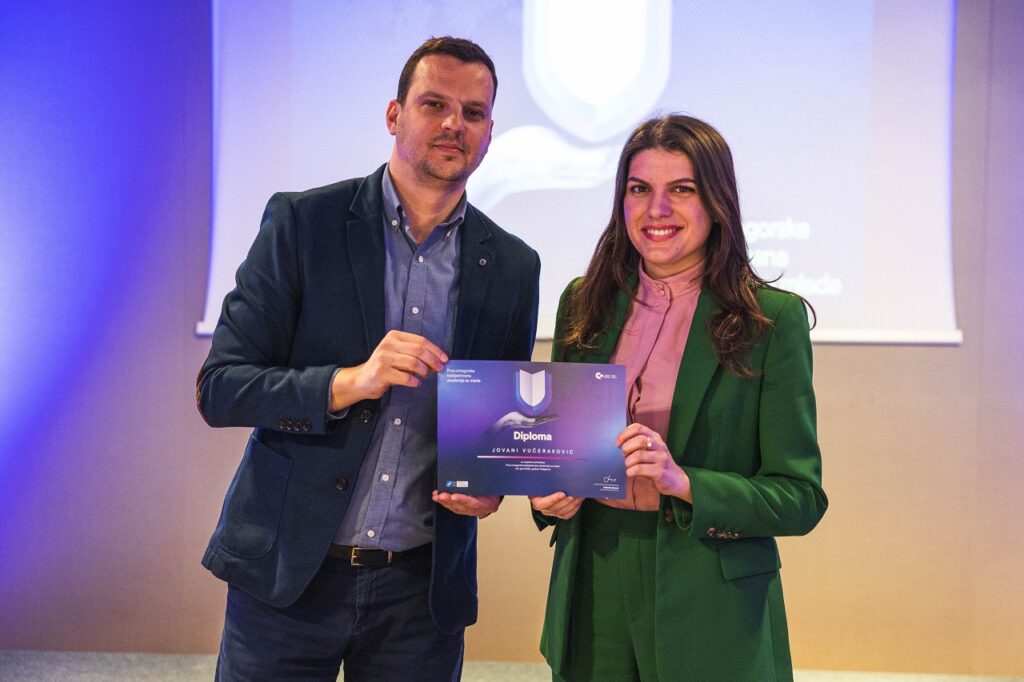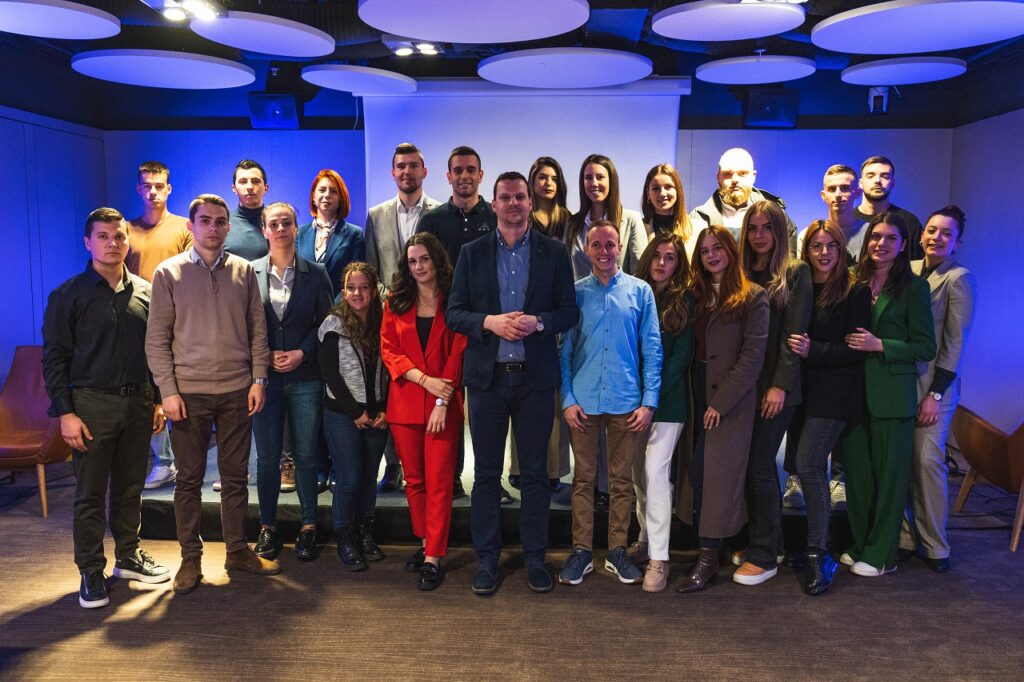Today in Podgorica diplomas were awarded to the 1st Montenegrin Youth Security Academy, which was organized by the Centre for Civic Education (CCE) within the project of the same title, with the support of the NATO Public Diplomacy Division.
The Academy gathered 20 students who had the opportunity to participate in interactive lectures with lecturers from Montenegro and abroad. The focus was on getting to know the NATO alliance and its foreign policy, the role of Russia in the Western Balkans, the position of religious organizations in the growing extremism among young people, and the responsibilities of institutions in processes that are particularly vulnerable to foreign influences. The participants had the opportunity to learn how to recognize disinformation in traditional media and social media, identify bots and trolls, learn how to verify information, get acquainted with the basic concepts of cyber security, and mechanisms of protecting privacy in the online environment, but also with communication policy of NATO in Montenegro.
The participants of the 1st Montenegrin Security Academy were addressed, at the opening, by Carmen Romero, NATO Deputy Assistant Secretary General for Public Diplomacy, who emphasized the importance of Montenegro’s participation in the joint activities of the NATO alliance and underlined: “NATO does not seek conflicts, nor does it pose a threat to Russia, but we will continue to respond to Russian threats and actions in a united and responsible way. Unity and responsibility are key messages today as we celebrate the 74th anniversary.”
“Montenegro is a member of the NATO alliance, and with this Academy, we want to get interested young people in these issues in a more meaningful and for them closer way. We live in a dynamic age, and knowledge in these areas should be constantly upgraded, although sometimes we think that we have mastered some topics. This is particularly important due to the ongoing security challenges in the country, the neighborhood, and beyond – especially when it comes to Russian aggression against Ukraine. We at the CCE are sure that the first generation of the Montenegrin Youth Security Academy is only an initial capsule for new generations who will acquire knowledge in areas that concern their present, but also the future, because this form of informal education is important for them,” said during the opening Damir Nikočević, Development Coordinator at the CCE.
The lecturers at the 1st Montenegrin Security Academy were: Nikoleta Đukanović, professor at the University of Donja Gorica (Humanistic studies); Radmila Perović, Head of the NATO and EU Directorate in the Ministry of Defense; Boban Batrićević, historian; Milica Kovačević, programme director of the Center for Democratic Transition (CDT); Oleg Gerasimenko, ambassador of Ukraine in Montenegro; Milan Jovanović, an analyst at the Digital Forensic Center (DFC); Filip Milošević, community development coordinator of the SHARE Foundation, engineer for audio and video technologies; Filip Adžić, Minister of Interior and coordinator of the Ministry of Defense in the Government of Montenegro; and Raško Konjević, former Minister of Defense in the Government of Montenegro and President of the Social Democratic Party (SDP).
“During the Academy, we had the privilege and pleasure to, first of all, talk with top experts, learn something new and exchange opinions. The main objective of the Academy was to strengthen the youth resistance to foreign malignant influences and to motivate them to respond to those influences, and I believe that this goal has been achieved, and I am completely satisfied with the knowledge and experience gained. I encourage all young people to apply to one of the following generations for Academy, as this kind of programme contributes to building academic integrity and helps us young people to learn about different topics,” said Sandra Rajković, participant of the Academy.
Vedran Vujisić shares similar impressions. “During the two-day, extremely well-conceptualized, diversified programme, adapted to the interests of young people/students, I gained very useful knowledge on strengthening the resistance of young people to malignant foreign influences. Educated and empowered young people can significantly contribute to the resilience and productivity of the wider social community. I see the importance of this and similar programmes in strengthening the capacities of young people in the context of critical observation and reflection on the socio-political and security situation: locally, regionally, and globally,” he stated.
Participants of the Academy applied for the programme through a competitive process that generated significantly more applications than the expected number of participants.
The 1st Montenegrin Security Academy was completed by Aleksandra Janinović, Darko Šćepanović, Edon Čauši, Filip Perić, Iva Jovićević, Jelena Bulatović, Jovan Dabović, Jovana Radulović, Jovana Vučeraković, Neda Srdanović, Nikola Banović, Nikola Vlahović, Omar Lekić, Sandra Rajković, Sofija Kirsanov, Tamara Musić, Tamara Terzić, Tijana Vidaković, Vedran Vujisić, and Željana Pajović.
Nikola Obradović, Project Assistant



